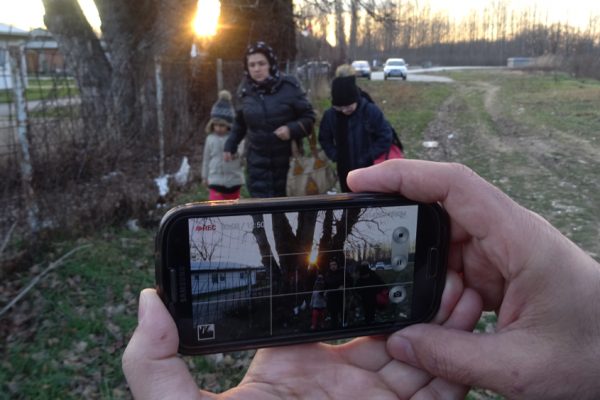On the run, attempting to save your family after a bounty is placed on your head – besides money and a few clothes, there’s one small item many would take without considering; our phones. Communication, safety and a distraction, but for Afghan director Hassan Fazili the camera phone he carries with him serves a wider purpose; to record the trials he and his family endure fleeing their home country and seeking asylum in Europe.
Midnight Traveller has a story to tell, regardless of authenticity (which isn’t in question); there are angles which the film wishes to capture beyond the image of ‘migrants on the run’. Chiefly we see this with Fazili, wife Fatima Hossaini (herself a film-maker) and their two young daughters Nargis and Zahra. Watching them playing with one another as turmoil and war rages across the borders is a haunting reminder of innocence, especially when we hear the girls cries of ‘I’m bored,‘ without much recollection of why they are fleeing.
As such, Midnight Traveller goes beyond the approach of a father capturing his journey, and rather encompasses them all. Quite often, Hassan will film his wife, who in turn may film Hassan playing with the children or even the assaults on other migrants in Bulgaria. It’s the single aspect of their lives which they currently have control over. These phones are lifelines, offering an inside look into the actuals of their emotions and thoughts, rather than a static image of a family fleeing the Taliban. We gain a semblance of how vital these phones are, despite protestations from certain media on why migrants all carry phones.
Acknowledging his perverse addiction to capturing the journey, Fazili’s obsession with cinema warps, finding himself compelled to draw out the camera at inappropriate moments, even at the potential cost of his family’s safety. This culminates in a tense, eye-opening, moment where Faizili frantically searches for his lost daughter but finds disgust in himself as he stops to take out his camera thinking; ‘this will make a great shot for the film.’ Fascinating, it reflects his growing rejection of cinema’s ‘perversion’ and blurs principal filmmaking ethics; even two film-makers, lovers of the craft, on occasion find their passion ‘dirty’.
At first the concept of an entire film shot on iPhones might perturb those who won’t recognise the effort involved in splicing together hundreds of clips into a flowing narrative. More so, with no external microphones or effects, Midnight Traveller relies on Emelie Mahdavian’s ability to weave the clips together, recording fresh audio offering further insight. The score of the film has a bizarre infusion of sound effects which are, at times, obvious to reflect the jarring sensation of trauma or even explosions, yet feel discomforting as we attempt to focus on the film.
Starkly intimate, Midnight Traveler takes unexpected directions due to Fazili striving to craft his narrative around the events, causing a peculiar documentary which, while authentic, has a sense of construct in Fazili’s mind which isn’t necessarily communicated. How the film ends is, tragically, how their journey ends – or rather, doesn’t. Fazili wishes for a neatly packaged ending, with flickers of the enjoyment his children could have on bikes, playing with toys as Fatima cooks and laughs. Instead, we leave the family, still awaiting news on their application to legally enter Hungary.
This isn’t a film solely on the atrocities facing those seeking asylum. It’s a staggeringly intimate piece of craftsmanship which frames family at the epicentre of the forthcoming trials awaiting those who find their homes ravaged, lives upended and their feet trudging across foreign soil attempting to secure safety.
@Filmhous, Edinburgh until Thu 13 Feb 2020
